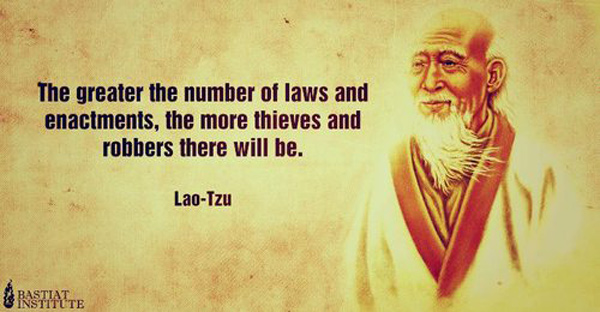
Most libertarians count Murray Rothbard as one of their mentors. They will know that Rothbard’s primary mentors were Ludwig Von Mises and Friedrich Hayek. But Rothbard dug deeper in his search for libertarian thinking. Here is a little-seen paper that he wrote in 1967:
The first libertarian intellectual was Lao-tzu, the founder of Taoism. Little is known about his life, but apparently he was a personal acquaintance of Confucius in the late sixth century BC and like the latter came from the state of Sung and was descended from the lower aristocracy of the Yin dynasty.
Unlike the notable apologist for the rule of philosopher-bureaucrats, however, Lao-tzu developed a radical libertarian creed. For Lao-tzu the individual and his happiness was the key unit and goal of society. If social institutions hampered the individual’s flowering and his happiness, then those institutions should be reduced or abolished altogether. To the individualist Lao-tzu, government, with its “laws and regulations more numerous than the hairs of an ox,” was a vicious oppressor of the individual, and “more to be feared than fierce tigers.”
Government, in sum, must be limited to the smallest possible minimum; “inaction” was the proper function of government, since only inaction can permit the individual to flourish and achieve happiness. Any intervention by government, Lao-tzu declared, would be counterproductive, and would lead to confusion and turmoil. After referring to the common experience of mankind with government, Lao-tzu came to this incisive conclusion: “The more artificial taboos and restrictions there are in the world, the more the people are impoverished… The more that laws and regulations are given prominence, the more thieves and robbers there will be.”
The wisest course, then, is to keep the government simple and for it to take no action, for then the world “stabilizes itself.” As Lao-tzu put it, “Therefore the Sage says: I take no action yet the people transform themselves, I favor quiescence and the people right themselves, I take no action and the people enrich themselves…”
Lao-tzu arrived at his challenging and radical new insights in a world dominated by the power of Oriental despotism. What strategy to pursue for social change? It surely was unthinkable for Lao-tzu, with no available historical or contemporary example of libertarian social change, to set forth any optimistic strategy, let alone contemplate forming a mass movement to overthrow the State. And so Lao-tzu took the only strategic way out that seemed open to him, counseling the familiar Taoist path of withdrawal from society and the world, of retreat and inner contemplation.
I submit that while contemporary Taoists advocate retreat from the world as a matter of religious or ideological principle, it is very possible that Lao-tzu called for retreat not as a principle, but as the only strategy that in his despair seemed open to him. If it was hopeless to try to disentangle society from the oppressive coils of the State, then he perhaps assumed that the proper course was to counsel withdrawal from society and the world as the only way to escape State tyranny.











Leave A Comment